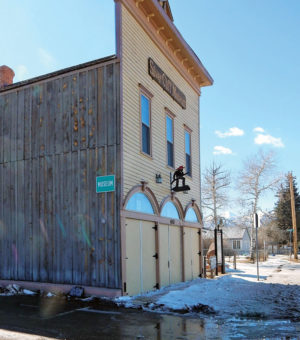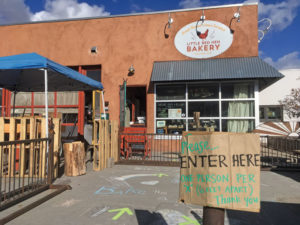By Martha Quillen
Together is now a buzzword for correct pandemic responses. We’ll get through this together. We’re in this together. Awhile back, the world got polarized. Exactly why isn’t clear, but furiously embracing hard-line, antagonistic stances became normal. Now, however, COVID-19 has pushed us into isolation and yet we’re clamoring for togetherness.
Under the circumstances, cries for togetherness seem a little too good to be true. However, I hope they inspire us regardless, and I’m certainly not alone.
To quote Mike Rosso in the April Colorado Central: “Maybe we citizens of this beautiful and amazing planet needed to hit the reset button. A big-time wake up call: to reconsider our spending habits, how well or poorly we treat our neighbors, what our priorities really are ….”
I couldn’t have said that better, but I suspect that reset button is supposed to change all of us—when what we want, I suspect, is for other people to change.
In our era, political conversations often skip right past solutions and settle on blaming others. Shaming each other seems to be the purpose of tweets and is all too common on Facebook. People often preface comments with they, as in they should be more courteous; they should be more reasonable; and they’re so ignorant, they shouldn’t be allowed to speak. But such critiques aren’t working. Nobody is saying, “You’re right, I’m stupid.”
I love history, but our current culture is so polarized, we’ve weaponized the past, too. It started with fights about confederate flags and statues, which were fair, since civil war iconography gained popularity in response to 20th-century civil rights movements. Then we removed statues portraying natives as savages, which also seemed fair. Then we jettisoned artwork portraying settlers, wagon trains, and mountain men, and now some groups want statues of congressmen and presidents who championed questionable causes removed from courthouses and capital buildings.
If we keep going in this direction, we’ll expunge all the scoundrels, corrupt politicians, and pompous white plutocrats from our records, and our entire political history will fit in one article.
Today, it’s not always easy to determine which history lessons are acceptable. Yet I think our salvation may lie in revisiting our past. The purpose of history books, articles, pioneer festivals, walking tours and museums is to share that past and make it everybody’s. In our era, partisan citizens make people feel as if they don’t belong, but history is where we all belong. Whether you arrived last year or are a native, you are part of the panoply.
My past began in Michigan. My grandparents lived in Detroit, and both of my parents were born in Detroit. When I was small we moved to the country because the great outdoors was reportedly good for children. For a time my parents flew to Chicago and San Francisco on weekends because our little town bored them, but I spent a lot of time outside. There was a huge park near my house, with a nature preserve with miles of trails, and one of our best-loved games was pretending we were Indians.
I was raised on Westerns: Wagon Train, Sugarfoot, Bronco Lane, The Lawman, Calamity Jane, The Unsinkable Molly Brown, John Wayne and more John Wayne. My grandparents’ dog, a Scotty named Mister Cisco, had a thing for Westerns. He would come into the kitchen to tell us it was time for his favorite show the way some dogs arrive with a leash between their teeth and demand a walk.
That dog would watch television for hours, crooning to his favorite characters and growling at the villains. Cisco was especially fond of horses, and if one neighed, you had to restrain him to keep him from attacking. Once a rattlesnake hissed at a trail hand onscreen, and the dog flew into a rage and hit the wooden stand beneath the television so hard, he knocked himself senseless. Cisco staggered back up, but was so confused he fell over on his side and stayed there, until my grandfather offered him a bit of beer and a pretzel and he miraculously recovered.
At that point, I’d never been further west than Wisconsin, but Western myths were more central to America’s national identity than Washington D.C.
In Michigan, I played in woods so wet moss grew on every side of the trees and the ground felt like spongy foam underfoot. My fantasy native self was a mite more Eastern than Western, I suppose, since I imagined I had a canoe and scary tattoos. My friends and I hid alongside trails waiting to ambush invaders, but nobody ever came. The mosquitoes there were so relentless nobody except children wandered far from the groomed and sprayed picnic areas.
To us that was the wilderness, the frontier, and the essence of the West, and we found it right there in our Midwestern backyard. Later my husband would inform me that I was from the East and Colorado and Nebraska were in the Midwest, an idea that confounded me. I was amazed when Ed and his friends insisted the entire eastern United States was paved from Chicago to New York City. I tried to tell them differently, but they wouldn’t listen, and they had a point. No matter how knowledgeable you are, the West symbolizes wilderness and freedom, and the East represents crowds, industries and sprawl.
To this day, I think it’s astounding that people think you can add subdivisions, condos, stores, motels, bars, restaurants and roads to mountain retreats until the deer end up living in backyards yet you still regard your city as an escape from civilization. Yet you can, because Western panache and gorgeous views deliver that delusion.
The West is a sentiment that lives in the mind—even though Vegas sits in the middle of it.
The East, however, has more attractions than many assume. As a kid, my favorite places included old lighthouses, Fort Ticonderoga, Mt. Vernon, Greenfield Village, Macinac Island and the Smithsonian. Historic sites, tales, articles and museums are terrific, because they make you feel as if you are a part of something: a people, a nation, a past. And you are.
We are here, and if we want this to be a better place, we have to figure out how to make it happen—because blaming others for what’s wrong isn’t helping. We’ve spent the last sixty years protesting inequities in our system, yet instead of reducing them, we seem to have preserved them. Why? Because our political attitudes have become so angry, disapproving and infuriating that we forget our common goals.
Hostile political discussions are excruciating and nonproductive, and we need to ease up. That critic who ridicules your political ideas isn’t John Dillinger, and he could change his mind. The United States is now a world power, and the world has gone global. Our responsibilities are enormous, and we’ve made mistakes. Our nation is coping with international crises, failed states, inequality, refugees and soaring health care costs, and we’ve faced hardships: 9/11/2001; HIV/AIDS; Katrina; gun violence; the 2008 economic collapse; boondoggles in Iraq, Afghanistan and elsewhere; disaster in Puerto Rico ….
But we are still standing, our lights are still on, our hospitals are overwhelmed but open, and your check is likely in the mail.
Yes, we definitely need to reconsider our priorities and work together, but the first thing we should do is change our view of ourselves. We have reduced our historic narrative to censorious tales about exploiters versus victims, when what we really are is one nation and one people with many minds and talents, who are astonishingly diverse and frequently don’t agree. But Americans have an astonishing record of rising to the occasion, and that’s what we’re trying to do.
L’chaim.
Martha Quillen currently worries about going to the grocery store, but saw a picture of Zhangjiajie National Forest Park in Hunan Province, China and thought, “I want to go there.” She’s betting you will too, if you look at the pictures.



